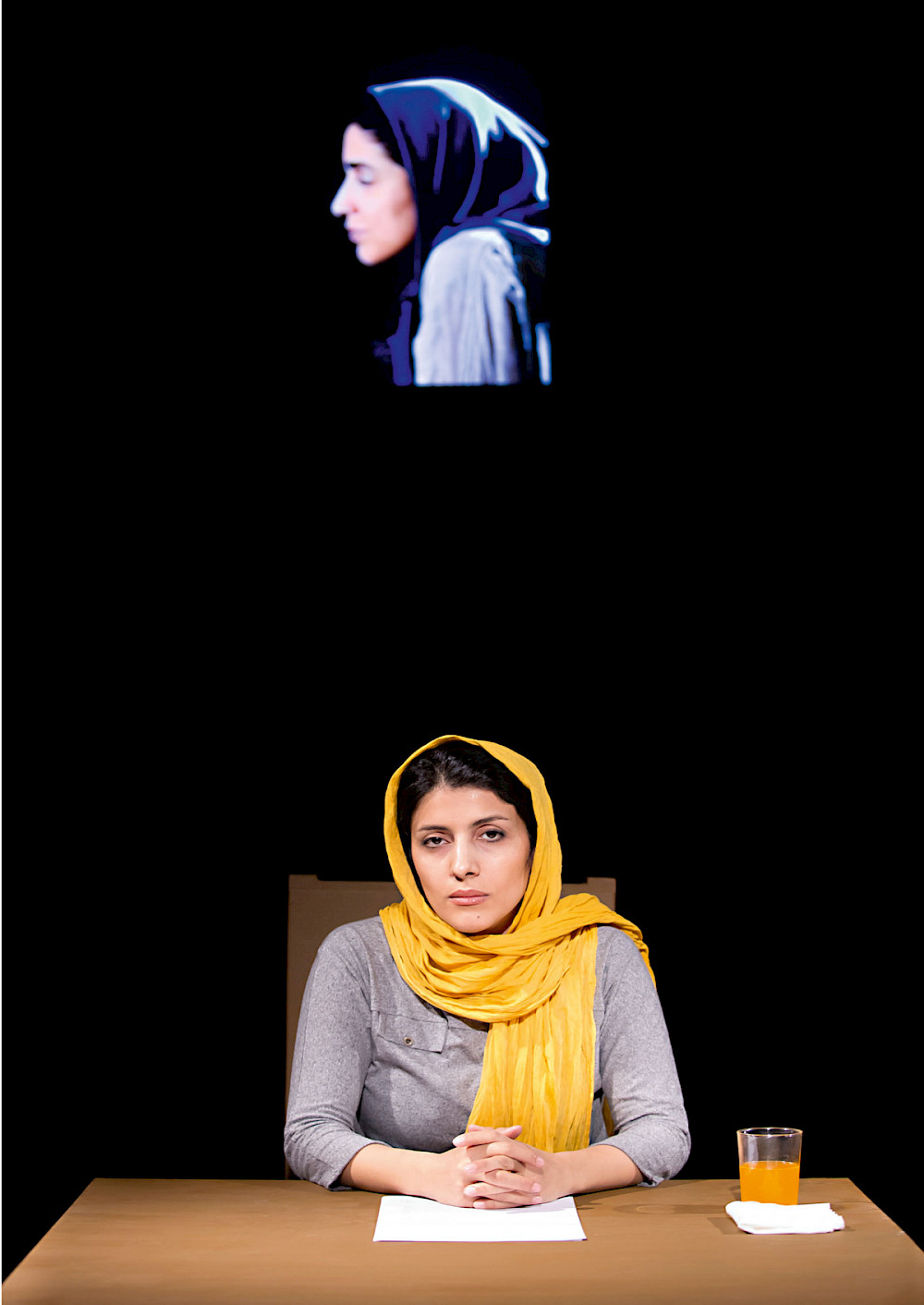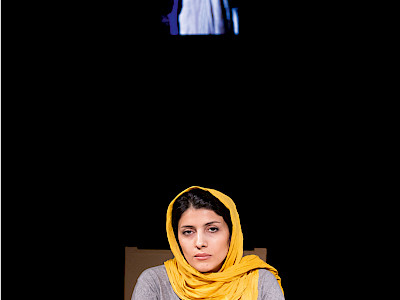07 — 10.05.2014
May 2004: Amir Reza Koohestani dumbfounds the Brussels public with Dance on Glasses, a piece about a break-up and the inability to stand up straight again and fight. With that performance, the young Iranian theatre maker established himself at the forefront of the international performing arts. May 2014: in a fictional setting, Koohestani decides to direct a DVD version of Dance on Glasses . He drums-up two actors to speak the voices, but this proves more difficult than expected. The gap with the past is too deep. The actors and director run aground on the wrong course of their own history. The question of who they were then and who they have become ends in a deep meditation about their personal lives and the situation in their country. Between the lines we detect a criticism of the ruling powers. Are we still afraid to dance on glass? With his typical sharp writing style and a clever performance, Amir Reza Koohestani has created an intimate portrait of himself and his living environment. Timeloss is sublime theatre by a Koohestani at the height of his abilities!
About Timeloss
“Isn’t working in Iran hard?” is a question I’m asked systematically. And people ask it in such a way that the only answer I’m expected to give is: “Yes, it’s hard”. This reassures them and allows them to pay their taxes and vote in their elections with an easy mind. Admittedly their situation, particularly their financial situation, is difficult, but haven’t they avoided the worst of it by not being born in a country like Iran?
It’s a fact that Iranian directors have to struggle to work, just like their counterparts more or less all over the world. What is specific to us is without doubt the type of adversaries that we’re having to fight. In Stockholm or Cologne, it’s about fighting empty seats and fussy critics, cheap bars and IMAX cinemas where they can pay half as much as they do to see one of my inert shows but have ten times more fun. In Iran, though, there are no bars, no nightclubs, no IMAXes, not even foreign films in cinemas. So except for those who prefer to stay at home and watch satellite TV or DVDs of the latest films from all over the world, all young people can do is go to the theatre or to the cinema to see Iranian films, or even spend time in galleries and cafés. So Iran might not be an ideal place for young people (as demonstrated by the ongoing brain drain), but it is a paradise for thespians! The fantasy of any theatre director is perhaps to see young audiences queue for hours to get tickets for his or her show. That’s happened to me on several occasions. I have to admit that the experience is so wonderful and so unique, that in order to be able to relive it I’m prepared to confront the strictest board of censors and most inflexible authorities again.
Twelve years ago, when I was working on Dance on Glasses, I remember we had less than 50 euros for our set. It was almost impossible to envisage having anything other than a table and two chairs. The theatre we were performing in only had four spotlights. With the help of a bit of aluminium foil, we turned them into profiles. Back then we had to adapt the aesthetics of our play to our limited budget. Dance on Glasses therefore became the story of two people who didn’t have the strength to get up from their seats, primarily because if they got up, they moved out of the light. When the play started touring, I thought that this inertia would perhaps need to be justified to foreign audiences in advance. I was afraid they’d starting wondering why the two characters didn’t move any closer to each other throughout the play. It was obvious to me. Less than a year before staging the play, I’d found myself in a similar situation when I split up from a girl I loved. I’d sunken deep into my armchair to the point of being incapable of getting up and turning down the music to be able to hear her voice and answer her questions. But when we rehearsed the play, I doubted whether other people had had comparable experiences and whether they would understand that although young and in good health, at times you can find yourself completely paralysed and unable to get up. The tour of Dance on Glasses around the world proved that very luckily, or unluckily, people everywhere are familiar with this experience. Subsequently, this type of character moved into my world. Thanks to the success of Dance on Glasses, my next shows were played in theatres that had enough lighting to allow the actors to get up without leaving the light. And yet they also lacked the strength to get up and bring about a change in their situation. Whether they were illegal immigrants in Amid the Clouds, assassins in Quartet: A Journey North or in Ivanov, based on Chekhov, they had sunken deep into their armchairs or their beds as if they had taken root there.
Twelve years on and I’m returning to Dance on Glasses. Its audience and I are twelve years older. Since 2006, the date of the last performance, I’ve very rarely seen the actors from the play. The world has changed. Saddam is dead, Spain won the World Cup, Ahmadinejad, Bush and Sarkozy came to power and have gone again, everything has changed. I’m not longer this angry young man. To be angry, you have to have faith in something, in a path, in a truth, and what’s more have the strength to fight to get there. I admit that I have nothing of that today. Neither my past certainties nor the strength to fight. Western journalists and critics would like me to talk about executions, the ban on homosexuality and the compulsory veil to make me a living witness of events related by their media every day. For their part, my people would like me to be an ambassador, presenting a different image to the one conveyed by the media in Iran, talking about the joys, the lack of concern, presenting a peace-loving, agreeable face to those who have only been shown representatives of the axis of evil or victims. My freedom is not so much constrained by the Office of Monitoring and Evaluation as by these expectations and judgements that alienate me. Timeloss is the fruit of this period of my work. A play that offers no answer because the person who wrote it feels that he has been taught a lesson as much as its audience has. I’ll leave the answers and solutions to politicians and TV broadcasts. My theatre continues to be that of the inability of men and women to get up. Perhaps it has become slightly more pessimistic. At the end of Dance on Glasses, at least, when the man saw that he was going to lose everything and the woman was going to leave him, he got up and moved towards her in the hope of holding on to her. In Timeloss, when the man loses everything, he remains where he is, happy to watch. Timeloss is a play about self-denial. It deals with the past – it’s not about regretting it, but about rejecting it. More specifically, it doesn’t deal with the past, but with how the past is seen. So it doesn’t really matter if you’ve seen Dance on Glasses, which is just an object, a pretext for looking back. Like Orpheus who turns round and looks, knowing that doing so could dramatically alter his fate.
Amir Reza Koohestani, April 2014
Text, direction & stage design
Amir Reza Koohestani
With on stage
Hassan Madjooni, Mahin Sadri
And on video
Abed Aabest, Behdokht Valian
Music & sound creation
Pouya Pouramin
Costumes designer
Negar Nemati
Video & technical direction
Davoud Sadri
Director’s assistant
Mohammad Reza Hosseinzadeh
Stage manager & surtitles operator
Negar Nobakht Foghani
Translation & surtitles adaptation
Massoumeh Lahidji
The play contains video excerpts of
Dance On Glasses
Text, direction & stage design
Amir Reza Koohestani
With
Sharareh Mansour Abadi, Ali Moini
Choreography
Ehsan Hemat
Music
Thousand Years by Sting
Production
Mehr Theatre Group
Created in 2001 in Shiraz (IR)
Production managers
Mohammad Reza Hosseinzadeh, Pierre Reis
Company & tour manager
Pierre Reis
Presentation
Kunstenfestivaldesarts, Théâtre National de la Communauté française
Production
Mehr Theatre Group
Co-production
Festival actOral with Marseille-Provence 2013 – Capitale Européenne de la Culture, La Bâtie – Festival de Genève
Show presented with the support of
ONDA Paris (Office national de diffusion artistique)


